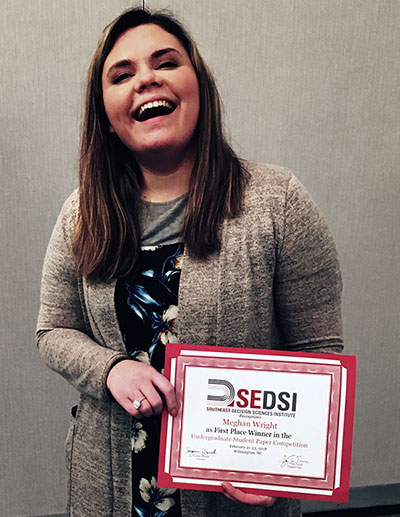Research
Faculty Publications
Brief list of IT faculty and students publications in the 2023-2024 academic year.
Artificial Intelligence:
- Sarveshwaran S, Karthikeyan S, Cruz M V, Shreyanth S, Niveditha S, Rajesh P K, “NLP-Based AI-Driven Resume Screening Solution for Efficient Candidate Selection,” ICICT 2024, London, Volume 2, 9th International Congress on Information and Communication Technology, October 2024.
- Onisha T A, Walee N A, Fojude M, Chen L, and Ji Y, “Detecting Fake Accounts and Identifying Malicious URLs on Social Networks using Deep Learning,” in Proceedings of the 2024 International Conference on Security and Management (SAM’24), under CSCE’24, Las Vegas, USA, July 22-25, 2024.
- Yavas C, Das J K, Akpomedaye B, Chen L, and Ji Y, “Unlocking the Power of Machine Learning in Cybersecurity Forensics: Identifying Malicious Files,” in Proceedings of the 2024 International Conference on Security and Management (SAM’24), under CSCE’24, Las Vegas, USA, July 22-25, 2024.
- Onisha T, Kim J & Seol J(2024), “Multi-Label Sound classification using Deep Learning Models,” 22nd IEEE/ACIS International Conference on Software Engineering, Management and Applications (SERA 2024).
- Rahman M A, Taheri H, & Kim J (2023, July). Deep learning model for railroad structural health monitoring via distributed acoustic sensing. In 2023 26th ACIS International Winter Conference on Software Engineering, Artificial Intelligence, Networking and Parallel/Distributed Computing (SNPD-Winter) (pp. 274-281). IEEE.
- Williams R C, Kim J and Xu Y(2024), Book Structure and Genre Classification using GNNs, 64th IACIS(International Association for Computer Information Systems) Annual Conference. – Accepted.
- Yavas C E, Kim J, & Chen L (2024). Exploring Flavors Through AI: The Future of Culinary Taste Prediction, 22nd IEEE/ACIS International Conference on Software Engineering, Management and Applications (SERA 2024).
- avas C E, Kim J, and Chen L, “Exploring Flavors through AI: The Future of Culinary Taste Prediction,” in Proceedings of the 22nd IEEE/ACIS International Conference on Software Engineering Research, Management and Applications (SERA 2024), Honolulu, Hawaii, USA, May 30 – June 1, 2024.
- Balogen E, & Wimmer H (2024, April). Comparative analysis of Convolutional Neural network-based counterfeit detection: keras vs. Pytorch. In IEMTRONICS International Conference. Springer Nature Book Series.
- Bokolo B G, *Ogegbene-Ise E, Chen L, and Liu Q, “Crime-Intent Sentiment Detection on Twitter Data Using Machine Learning,” in Proceedings of the 2023 8th IEEE International Conference on Automation, Control and Robotics Engineering (CACRE), Hong Kong, China, July 13-15, 2023. DOI: 10.1109/CACRE58689.2023.10208384.
- Bokolo B G, Chen L, and Liu Q, “Deep Learning Assisted Cyber Criminal Profiling,” in Proceedings of the 2023 IEEE 6th International Conference on Big Data and Artificial Intelligence (BDAI), Jiaxing, China, July 07-09, 2023. DOI: 10.1109/BDAI59165.2023.10257003.
- Kim J, Seol J, Onisha T A, & Ji Y. (2023, December). Hyper Parameter Classification on Deep Learning Model for Cryptocurrency Price Prediction. In 2023 IEEE/ACIS 8th International Conference on Big Data, Cloud Computing, and Data Science (BCD) (pp. 162-169). IEEE.
- Jamal S, Wimmer H (2023). Performance Analysis of Machine Learning Algorithm on Cloud Platforms: AWS vs Azure vs GCP. In: Gibadullin, A. (eds) Information Technologies and Intelligent Decision-Making Systems. ITIDMS 2022. Communications in Computer and Information Science, vol 1821. Springer, Cham. https://doi.org/10.1007/978-3-031-31353-0_5.
- Yavas C E, Kim J, and Chen L, “Mastering Precision in Pivotal Variables Defining Wine Quality via Incremental Analysis of Baseline Accuracy,” in IEEE Access, vol. 12, pp. 105429-105459, August 1, 2024, doi: 10.1109/ACCESS.2024.3436603. (Impact Factor: 3.4, Scimago Q1).
- Yavas C E, Chen L, Kadlec C, and Ji Y, “Predictive Modeling of Earthquakes in Los Angeles With Machine Learning and Neural Networks,” in IEEE Access, vol. 12, pp. 108673-108702, August 15, 2024, doi: 10.1109/ACCESS.2024.3438556. (Impact Factor: 3.4, Scimago Q1).
- Rahman M A, Jamal S, Cruz M V, Silwal B, Taheri H, “In situ process monitoring of multi‑layer deposition in wire arc additive manufacturing (WAAM) process with acoustic data analysis and machine learning,” The International Journal of Advanced Manufacturing Technology, Volume 132, pages 5087–5101, 29 April 2024.
- Wimmer H, Du J, Heri P, (2023). Text Prediction Using Artificial Intelligence: An Analysis of Two Text Prediction Systems. Journal of Information Systems Applied Research 16(1) pp 4-12. http://JISAR.org/2023-1/ ISSN: 1946 – 1836.
- Ji Y, Marian AD, Montie EW (2024) Deep-learning-based detection of recreational vessels in an estuarine soundscape in the May River, South Carolina, USA. PLoS ONE 19(7): e0302497. https://doi.org/10.1371/journal.pone.0302497.
Brain-Computer Interfaces:
- Jamal S, Cruz M V, Kim J, “Cloud-Based Human Emotion Classification Model from EEG Signals,” IEEE Xplorer, 2023 IEEE 14th Annual Ubiquitous Computing, Electronics & Mobile Communication Conference (UEMCON), November 2023, New York, NY, USA.
- Muresan A O, Cruz M V, Hamza-Lup F G, “Objective Emotion Quantification in the Metaverse Using Brain-Computer Interfaces,” Springer Nature Switzerland, 353-361, IFIP International Internet of Things Conference, October 2023, Texas, USA.
- Patel V, Shah A, Usha G, Patel S, Panchal P, Cruz M V, “A comparison of advanced learning models for the P300 brain-computer interfaces”, AIP Conference Proceedings, Proc. 3075, 020064 (2024), July 29, 2024.
- Jamal S, Cruz M V, Chakravarthy S, Wahl C, Wimmer H, “Integration of EEG and Eye Tracking Technology: A Systematic Review,” IEEE Xplorer, 209-216, SoutheastCon 2023, May 2023 Florida, USA.
- Jamal S, Cruz M V, Wimmer H, “Integration of EEG and Eye Tracking Technology: A Systematic Review,” IEEE Southeast Con, 2023 Forthcoming.
- Cruz M V, Jamal S, Wahl C, Chakkaravarthy S, “Investigating the Impact of Mindful Breathing Meditation on Brain Waves: A Study on Young Adults”, Neuropsychological trends -35/2024.
Cybersecurity:
- Adaramola O O, Odigbo C, Chen L, Kim J, and Ji Y, “Challenges in Blockchain Securities: Key Management & Decentralized Identity Systems”, in Proceedings of the 2024 International Conference on Security and Management (SAM’24), under CSCE’24, Las Vegas, USA, July 22-25, 2024.
- Adesola A, Chen L, Ji Y, and Kim J, “Application of Rototics Process Automation to the MOVEit Attack: A Case Study”, in Proceedings of the 2024 International Conference on Security and Management (SAM’24), under CSCE’24, Las Vegas, USA, July 22-25, 2024.
- Stuckey J, Shalan A, Chen L, and Ji Y, “Comparative Analysis of Black Box Attacks in Information Security”, in Proceedings of the 2024 International Conference on Security and Management (SAM’24), under CSCE’24, Las Vegas, USA, July 22-25, 2024.
- Odigbo C S, Wimmer H, and Kim J, “Mapping Cyberattack Patterns and Detection: An Azure Sentinel Approach,” 22nd IEEE/ACIS International Conference on Software Engineering, Management and Applications (SERA 2024). Selected to publish in the Springer Book Series – Studies in Computational Intelligence Series(SCIS).
- Elelegwu D, Chen L, Ji Y, and Kim J, “A Novel Approach to Detecting and Mitigating Keyloggers”, in Proceedings of the IEEE SoutheastCon 2024, Atlanta, USA, March 15-24, 2024. https://ieeexplore.ieee.org/document/10500122.
- Trawinski I, Wimmer H, and Kim J. “Anomaly Detection in Intrusion Detection System using Amazon SageMaker.” 2023 IEEE/ACIS 21st International Conference on Software Engineering Research, Management and Applications (SERA). IEEE, 2023.
- Odigbo C S, Wimmer H and Kim J(2024), “Mapping Cyberattack Patterns and Detection: An Azure Sentinel Approach,” 22nd IEEE/ACIS International Conference on Software Engineering, Management and Applications (SERA 2024). Selected to publish in the Springer Book Series – Studies in Computational Intelligence Series(SCIS).
- Jamal S, Wimmer H, & Sarker I H (2024). An improved transformer‐based model for detecting phishing, spam, and ham emails: A large language model approach. Security and Privacy, e402.
- Omakwu S, Wimmer H, Rebman C, (2024). Using Textual Analytics to Process Information Overload of Cyber Security Subreddits. Journal of Information Systems Applied Research 17(1) pp 64-74. https://doi.org/10.62273/AJJR5232.
Data Science:
- Mohamed A, Walee N, Tarmissi K. Vulnerability Analysis and Quality Improvement of Early Wildfire Detection Datasets for Machine-Learning Applications. In: Proceedings of the 13th IEEE International Conference on Communication Systems and Network Technologies (CSNT 2024); 2024. To appear.
- Walee N, Mohamed A. Flutter-Based Cross-Platform Data Visualization of Real-Time Road Incident Analysis & Prediction. In: Proceedings of the 5th International Conference on Artificial Intelligence, Robotics, and Control (AIRC 2024); 2024. pp. 18-22.
- Richard-Ojo O, & Wimmer H (2024). Stock price prediction using sentiment based LSTM: S&P500 vs Reddit posts. The Proceedings of IEMTRONICS 2024.
- Jamal S, Elenin W A, and Chen L, “Developing and Evaluating Data-Driven Heart Disease Prediction Models by Ensemble Methods on Different Data Mining Tools”, in Proceedings of the 2023 IEEE 14th Annual Ubiquitous Computing, Electronics & Mobile Communication Conference (UEMCON), New York, NY, USA, October 12-14, 2023. DOI: 10.1109/UEMCON59035.2023.10315997.
- Arokodare Q, Wimmer H, and Du J, “Big Data Approach For IoT Botnet Traffic Detection Using Apache Spark Technology”. 2023 IEEE 13th Annual Computing and Communication Workshop and Conference (CCWC), 2023
Education:
- Rebman C, Wimmer H, Booker Q, Breese J, Rogers P, McMurtrey M, and Levkoff, “Faculty Opinions on Student Preparation, Performance, And Evaluations Post Covid”. Southwest DSI Conference, 2023.
- Booker Q E, Rebman Jr C M, Wimmer H, Levkoff S, Powell L, & Breese J (2024). Data Analytics Position Description Analysis: Skills Review and Implications for Data Analytics Curricula. Information Systems Education Journal, 22(3), 3.
- Mariani R, Wimmer H, Powell L, & Tanner T (2024). A Comparative Analysis of Digital Marketing Online Synchronous Course Delivery With and Without Virtual Reality Software. Journal of Higher Education Theory & Practice, 24(1).
- Powell L, Mariana R, Rebman C, Hendon M, Higher Education Enrollment Crisis:The Importance of Examining Student’s Choice of Modality, Issues in Information Systems, Vol 24, No.3, 2023.
Image Processing:
- Ajuluchukwu M, Shalan A, Chen L, Ji Y, and Balogun E, “Low-Resolution Image Enhancement using Generative Adversarial Networks”, in Proceedings of the 2024 IEEE Annual Congress on Artificial Intelligence of Things (IEEE AIoT), Melbourne, Australia, July 24-26, 2024.
- Akpomedaye B, Shalan A, Chen L, and Ji Y, “An Adversarial Training Approach for Defending Against Object Misclassification in Smart Vehicles”, in Proceedings of the 2024 International Conference on Security and Management (SAM’24), under CSCE’24, Las Vegas, USA, July 22-25, 2024.
- Mohamed A, Walee N, Rahman M, Hefny M. Improving Deep Machine Learning for Early Wildfire Detection from Forest Sensory Images. In: Proceedings of the 5th International Conference on Artificial Intelligence, Robotics, and Control (AIRC 2024); 2024. pp. 18-22.
- Walee N, Shalan A, Kadlec C, Rahman M. Optimizing Deep Learning Accuracy: Visibility Filtering Approach for Early Wildfire Detection in Forest Sensor Images. In: Proceedings of the 22nd IEEE/ACIS International Conference on Big Data, Cloud Computing, and Data Science (BCD 2024); 2024 Mar. To appear.
- Pittendreigh M, Powers K, Cruz M V, Pellettieri J, “Quantitative Analysis of Planarian Pigmentation”, Springer Link, Methods in Molecular Biology, MIMB, volume 2680, pp 253–261, 11 July 2023.
- Saminathan K, Banerjee T, Rangasamy D P, Cruz M V, “Segmentation of Thoracic Organs through Distributed Extraction of Visual Feature Patterns”, Current Gene Therapy, Volume 24, Number 3, 2024, pp. 217-238(22), 1 June 2024.
Networking and Data Center:
- Sanusi H, Utic Z, & Kim J (2023, December). Improving Network Intrusion Detection Using Supervised Learning for Feature Selection. In 2023 IEEE/ACIS 8th International Conference on Big Data, Cloud Computing, and Data Science (BCD) (pp. 42-48). IEEE.
- Kangethe L and Chen L, “A Hybrid Risk Assessment Technique for Data Centers”, in Proceedings of the 2024 International Conference on Security and Management (SAM’24), under CSCE’24, Las Vegas, USA, July 22-25, 2024.
- Kangethe L, Wimmer H, Rebman Jr. CM, (2024). Network Intrusion Detection system with Machine learning Intrusion Detection System with Machine Learning As a Service. Journal of Information Systems Applied Research 17(3) pp 4-15. https://doi.org/10.62273/EWQL5023.
Systems and Applications:
- Chakkaravarthy S S, John M M, Cruz M V, Kumar R A, Anitha S, and Karthikeyan S, “MetaHap: A Low-Cost Haptic Glove for Metaverse,” Springer Nature Switzerland, 362-372, October 2023, Texas, USA.
- Walee N A, Onisha T A, Akinola A, van Deventer G, and Chen L, “Impact of Agile Methodology in IT Industries: A Comparative Study”, in Proceedings of the IEEE SoutheastCon 2024, Atlanta, USA, March 15-24, 2024. https://ieeexplore.ieee.org/document/10500231.
- Omakwu S O and Chen L,“Integrating Sample Iterative Communication Model into Project Management Life Cycle Phases”, in Proceedings of the American Council on Science & Education – CSCE 2023, Las Vegas, USA, July 24-27, 2023. Acceptance rate: 24%. https://american-cse.org/csce2023/publisher.
- Ukene D, Wimmer H, and Kim J. “Evaluating the Performance of Containerized Webservers against Web Servers on Virtual Machines using Bombardment and Siege.” 2023 IEEE/ACIS 21st International Conference on Software Engineering Research, Management and Applications (SERA). IEEE, 2023.
- Odeniran Q, Wimmer H, “JavaScript Frameworks -A Comparative Study.” 2023 IEEE IRTM Conference, 2023.
- Rebman C, Wimmer H, “An Exploratory Study Comparing Zoom and Google Technology As A Group Decision Support System.” Southwest DSI Conference, 2023
- Gray D, Shalan A, Kadlec C, Chen L. Sales Predictions for Video Games using Predictive Analytics of Market Data. In: Proceedings of the 11th International Conference on Computer, Control, Informatics and its Applications (IC3INA 2024); 2024 Oct; Indonesia, Submitted.
- Rahman M A, Kim, Dababneh F, & Taheri H. (2024). Railroad condition monitoring with distributed acoustic sensing: an investigation of deep learning methods for condition detection. Journal of Applied Remote Sensing, 18(1), 016512-016512.
- Karthikeyan S, *AakashRaj R, Cruz M, Chen L, AjayVishal J L, and Rohith V S, “A Systematic Analysis on Raspberry Pi Prototyping: Uses, Challenges, Benefits, and Drawbacks,” IEEE Internet of Things Journal, vol: 10, issue 15, August 15, 2023. DOI: 10.1109/JIOT.2023.3262942. (Impact Factor: 10.6, Scimago Q1).
- Rebman C, Booker Q, Wimmer H, Levkoff S, McMurtrey M, Powell L, (2023). An Industry Survey of Analytics Spreadsheet Tools Adoption: Microsoft Excel vs Google Sheets. Information Systems Education Journal 21(5) pp 29-42. http://ISEDJ.org/2023-5/ ISSN: 1545-679X.
- Odeniran Q, Wimmer H, Rebman C, Node.js or PHP? Determining the Better Website Server Scripting Language, Issues in Information Systems, Vol 24. No. 1, 2023.
Student Research Awards
IT Students Won Big in 2024 Research Symposium
Our students proved their brilliance again at the 2024 PCEC Research Symposium, securing five prestigious awards including two 1st places, two 2nd places, and one 3rd place totaling $2,350. Their contributions, represented through 21 posters, ranked second among the six PCEC departments. This remarkable success on April 19 underscores the dedication and talent within our student body.
These outstanding research projects were nurtured under the guidance and mentorship of our esteemed faculty, reflecting the collaborative spirit and commitment to excellence in our department.
Below is the list of awards and posters acknowledged, highlighting the commendable efforts of our student authors and their faculty mentors:
- Tasnim Akter Onishan, Nafeeul Alam Walee, Michael Fojude, Faculty Mentor: Dr. Lei Chen, “Detecting Fake Accounts and Identifying Malicious URL Distribution on Social Networks using Deep Learning”, 1st Place Gulfstream Outstanding Female Researcher Award ($1,000), Paper to be submitted for publication.
- Suhaima Jamal, Faculty Mentor: Dr. Hayden Wimmer, “Perception and Evaluation of Text-to-Image Generative AI Models: A Comparative Study of DALL-E, Google Images, GROK, and Stable Diffusion”, 1st Place SALT Award for Computing ($500).
- Nafeeul Walee, Faculty Mentor: Dr. Hayden Wimmer, “Comparative Analysis of Predictive Results from Machine Learning Algorithms”, 2nd Place SALT Award for Computing ($350), Paper to be submitted for publication.
- Oluwatomisin Ebun Arokodare, Faculty Mentor: Dr. Hayden Wimmer, “Transformer Models for Clinical Note Summarization”, 2nd Place Gulfstream Excellence in Engineering Award ($350), Paper to be submitted for publication.
- Suhaima Jamal, Faculty Mentors: Dr. Meenalosini Vimal Cruz and Dr. Jongyeop Kim, “Cloud-Based Human Emotion Classification Model from EEG Signals”, 3rd Place SALT Award for Computing ($150), Paper published by IEEE UEM Conference.
In addition, the following posters were also highly rated in the symposium:
- Tasnim Akter Onisha, Faculty Mentor: Dr. Jongyeop Kim, “Multi-Label Sound Classification using Deep Learning Techniques”. Paper accepted by an international conference.
- Tasnim Akter Onisha, Faculty Mentor: Dr. Hayden Wimmer, “Facial Expression Analysis for Video Recognition”. Paper to be submitted for publication.
- Helen Adesola, Faculty Mentor: Dr. Lei Chen, “MOVEit Attack: Protecting Organizations from Similar Attacks Using Robotic Process Automation”. Paper to be submitted for publication.
- Nafeeul Walee, Faculty Mentor: Dr. Jongyeop Kim, “Comparative Analysis of Hybrid Generative Adversarial Networks on Upscaling Satellite Imagery”. Paper to be submitted for publication.


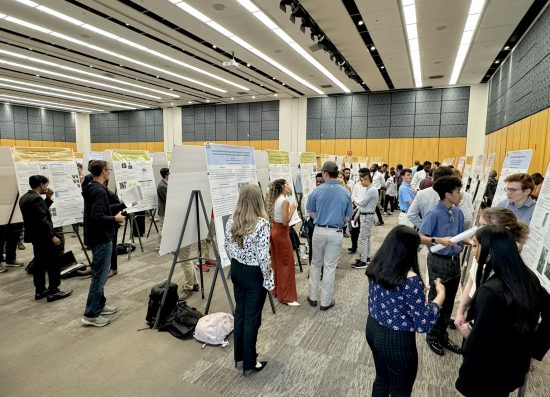
Other Student Research Awards
Congratulations to Suhaima Jamal for Winning Best Presenter Award at IEEE Annual UEMCON’23
We are absolutely delighted to share that Ms. Suhaima Jamal has received the Best Presenter Award at the annual IEEE Ubiquitous Computing, Electronics & Mobile Communication Conference (UEMCON 23), held from October 12th to 14th at Columbia University in New York. The annual IEEE UEMcon conference serves as a vital platform, facilitating the exchange of ideas, knowledge, and innovations among researchers, educators, and students, not only within the USA but also from different corners of the world.
“Having my research papers accepted at this conference and presenting them to respected scholars has been a truly enlightening experience. What makes it even more special is the incredible recognition I received amidst a gathering of distinguished scholars and researchers from numerous universities across the USA and a multitude of countries. I want to extend my deep appreciation and thanks to my supervisors, Dr. Chen, Dr. Cruz, and Dr. Kim, for their continuous support throughout my work on the papers.” she said.
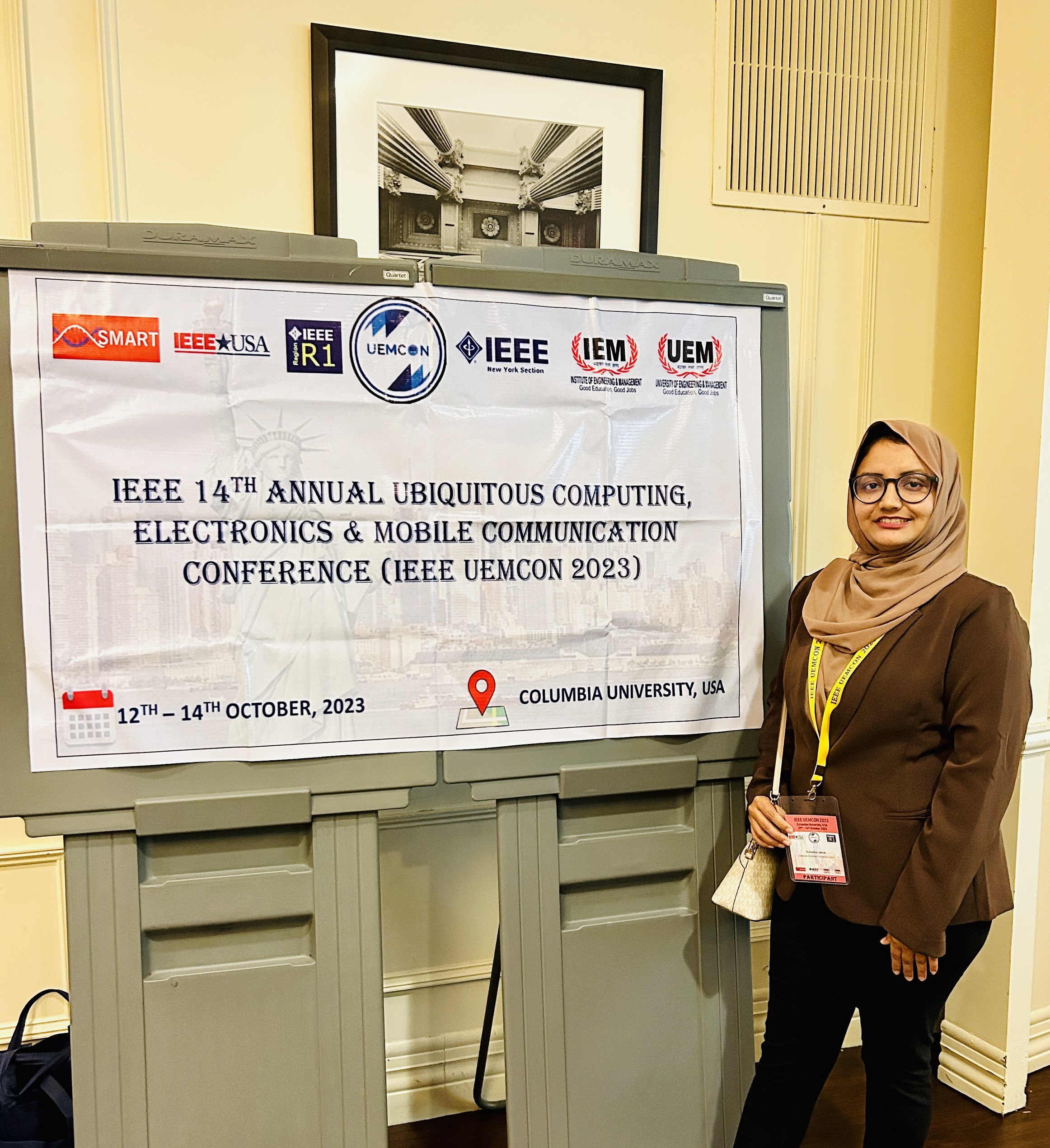
IT Student Wins Best Undergraduate Paper Award at SE DSI
Caitlin McOsker won the award for the best undergraduate research paper at the Southeast Decision Sciences Institute (SE DSI) conference on February 12-14, 2020 in Charleston, SC.
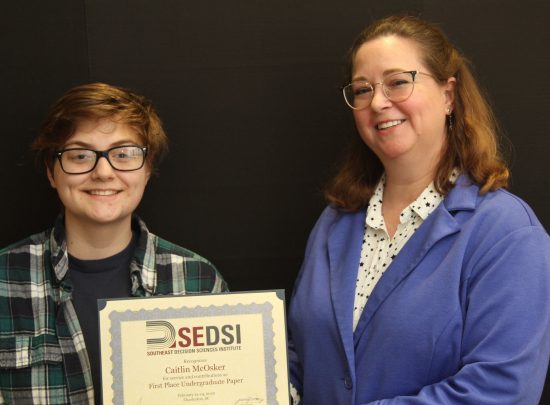
Her paper documented a process for scraping, cleaning, processing and analyzing job ads using Python. The text was analyzed to look at characteristics of IT jobs. Dr. Cheryl Aasheim served as her faculty mentor on the project.
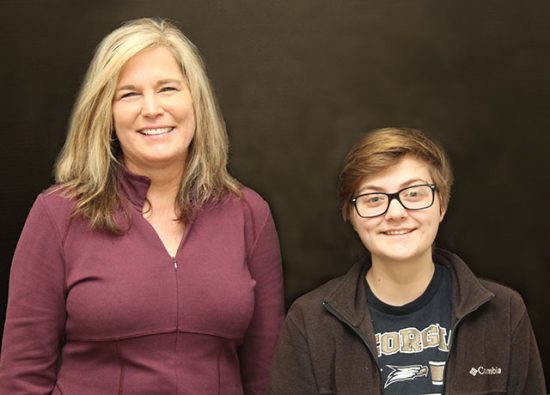
MSAE Student Sushmita Khan and Drs. Kaleta and Yin Win Best Paper Award at SAIS 2018
Drs. Jeffrey P. Kaleta and Jingjing Yin along with Ms. Sushmita Khan won the Best Faculty / Student Paper Award at the 21st Annual Meeting of the Southern Association of Information Systems (SAIS) in Atlanta, GA. Their paper, Twitter Sentiment Toward Autism During Autism Awareness Month, was presented by Dr. Kaleta and Ms. Khan at the 2018 annual SAIS conference held on March 23-24th.
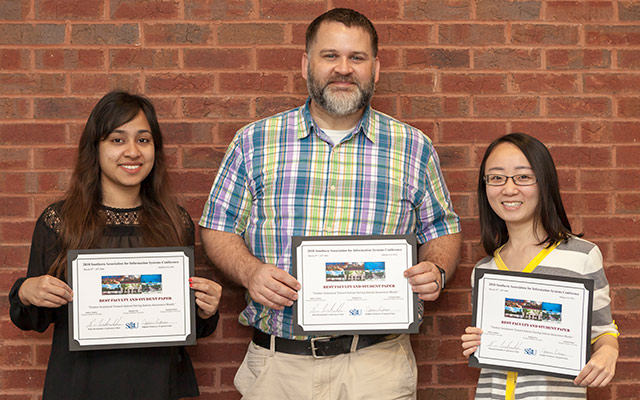
This study was a collaborative project investigating the topics and public opinions during autism awareness month as expressed on Twitter, a social media platform. The outcome of this work is the first of several initiatives investigating public views of health-related concerns over social media, making use of a variety of text analysis techniques.
Dr. Kaleta is an assistant professor in the Department of Information Technology within the Allen E. Paulson College of Engineering and Computing, Dr. Yin is an assistant professor in the department of Biostatistics located within the Jiann-Ping Hsu College of Public Health, and Ms. Khan is completing her Master’s of Applied Engineering in IT this Spring 2018.
IT Students Win SE Decision Sciences Institute 2018 Best Paper Award
Ryan Wilcauskas, Meghan Wright and Kaitlin Reid won the Best Undergraduate Student Paper Award at the 48th Annual Meeting of the Southeast Decision Sciences Institute in Wilmington, NC. The title of their paper was The Impact of Workplace Practices on Patients Seeking Mental Health Treatment: A Decision Tree Approach.
Part of the paper came from the work they did in a data mining course taught by Dr. Cheryl Aasheimthat they took as part of their degree program, Bachelor of Science in Information Technology, in Fall 2017. They continued their work under the mentorship of Dr. Aasheim, running additional models and refining the paper after class ended through the winter break.
Ryan and Meghan attended the conference on February 21-23, 2018. Kaitlin graduated this past Fall and, therefore, could not attend. The students received certificates and a monetary award.
The students received funding to attend the conference through an undergraduate research grant they won in the Allen E. Paulson College of Engineering and Computing competition.
IT Graduate and Undergraduate Students Win Best Paper Award at SE DSI 2017
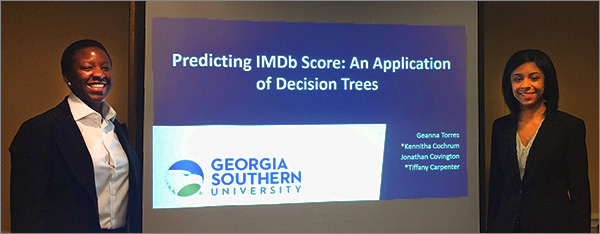
The paper titled “Predicting IMDB Score: An Application of Decision Trees” by Geanna Torres, Kennitha Cochrum, Jonathan Covington and Tiffany Carpenter took first place in the undergraduate student paper award competition at the 2017 meeting of Southeast Decision Sciences Institute (SE DSI). The 47th annual conference was held in Charleston, SC on February 22 – 24, 2017. Kennitha Cochrum and Tiffany Carpenter were the presenters at the conference. Geanna, Kennitha, Jonathan and Tiffany are all seniors in the BS in Information Technology program at Georgia Southern University.
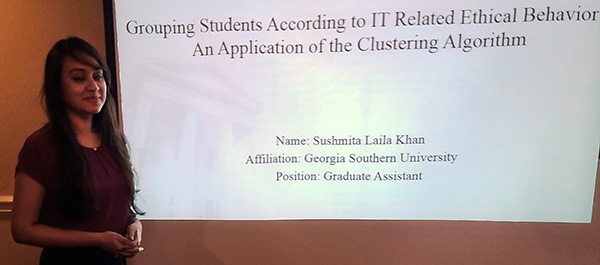
The paper titled “Grouping Students According to IT-Related Ethical Behavior: An Application of the Clustering Algorithm” by Sushmita Khan took first place in the graduate student paper award competition. Sushmita is in her second semester in the MS in Applied Engineering in the IT track.
SE DSI is a regional subdivision of the Decision Sciences Institute, a professional organization of academicians and practitioners interested in the application of quantitative and behavioral methods to the problems of society.
All students started the project in their data mining course in the IT program last semester and were mentored by their faculty advisor, Dr. Cheryl Aasheim, Professor of Information Technology.
IT Students Win Undergraduate Student Best Paper Award for Southeast Decision Sciences Conference
Congratulations to Information Technology students Jordan Bacon, Chris Bergin, Michael Canter and Matthew DeAngelis for winning the Best Paper Award in the Undergraduate Student Research track at the Southeast Decision Sciences Institute conference held in Savannah on February 25 – 27th, 2015.
Under the direction of Dr. Cheryl Aasheim, these students authored a paper titled Analysis of Georgia Southern University Student College Football Attendance that utilized data mining techniques to analyze factors that affect football attendance at Georgia Southern University. The students presented their paper at the conference on February 26, 2015.
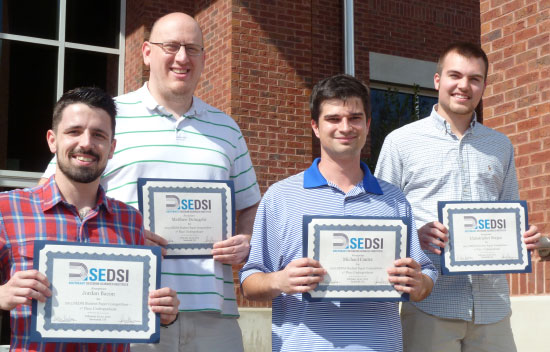
The research was an extension of a semester long project the students completed in their data mining course that is part of the Information Management specialization within the BS in Information Technology Program.
Networking Research Labs
There are two labs that mirror images of each other, separated by a folding wall. Each lab has 36 seats or 72 when joined. It is rare that we join the rooms for instruction. Joining the rooms is utilized for special events when the standard classroom model is not needed.
The student seating is arranged for easy access for the faculty member to move behind the students to offer support. The desks are lab tables that stand taller than an average computer table and require taller chairs. The tables are significant enough to allow students to build, dismantle, and diagnose other equipment, adding to the adaptability of the lab. The height of the tables allow students to work at the tables without having to be seated. Seats are simple rolling stools with backs.
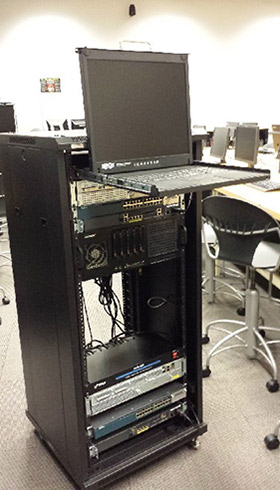
The room is carpeted with simple 2×2 carpet squares. This allows portions of the carpet to be replaced when stained or worn but more importantly, allows students to be able to remove sections of the carpet to expose the raised flooring below. The raised flooring is only 4 inches high but allows for the room to change over time and allows the network floor boxes to be easily maintained. It also allows students to work with structured cabling and not just patch cables.
There are two networks in each classroom: one private to the classroom and one that connects to the campus network. Each of the classrooms is on an individual vlan so that if and when students make mistakes, problems are confined to the classroom. The private network allows students to build and test many different scenarios without worry of damage to exterior systems. Both networks terminate in floor boxes and are then connected into the desks where students can quickly change from one network to the other.
The other termination point for the campus network is a network closet that is not accessible to the students and is a patch panel in the front of the room for the private network. The patch panels for the private network are mounted into a half height rack that also contains varied networking equipment. This equipment is then accessible to the students at their seats.
One of the classrooms is equipped with computers with two network interfaces. This lab is used to teach some of the upper level networking courses, specifically some of the virtualization courses. The other lab’s computers have only one interface and this lab is used to teach some of the lower level courses where more hands-on configuration is necessary.
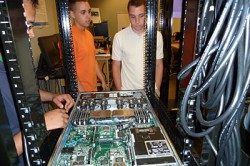
The teacher’s station for each classroom is equipped with a computer with dual monitors, one of which can be mirrored to the overhead projector. Also in the station is a document scanner, BlueRay player, and connections for a laptop. Some classroom management software is on each of the instructor machines but otherwise, the instructor computers are the same as the student computers.
To augment the networking equipment located at the front of the classrooms, 10 carts on wheels, each with routers, switches, a server, firewall, and a console, are available to be used in either classroom or elsewhere in the building. We have found that making sure that students have full view of the network (the raised flooring hides one run) from end to end aids in their understanding.
Last updated: 8/15/2024

